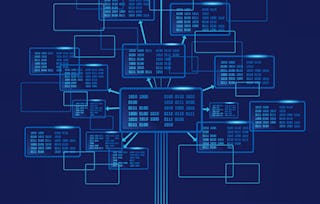L'analyse des données a remplacé l'acquisition des données en tant que goulot d'étranglement de la prise de décision fondée sur des données probantes - nous nous noyons dans ces données. L'extraction de connaissances à partir d'ensembles de données volumineux, hétérogènes et bruyants nécessite non seulement des ressources informatiques puissantes, mais aussi des abstractions de programmation permettant de les utiliser efficacement. Les abstractions qui ont émergé au cours de la dernière décennie combinent des idées provenant de bases de données parallèles, de systèmes distribués et de langages de programmation pour créer une nouvelle classe de plateformes d'analyse de données évolutives qui constituent la base de la science des données à des échelles réalistes. Dans ce cours, vous découvrirez le paysage des systèmes pertinents, les principes sur lesquels ils reposent, leurs compromis et la façon d'évaluer leur utilité par rapport à vos besoins. Vous apprendrez comment les systèmes pratiques ont été dérivés de la frontière de la recherche en informatique et quels sont les systèmes qui se profilent à l'horizon. Le cloud computing, les bases de données SQL et NoSQL, MapReduce et l'écosystème qu'il a engendré, Spark et ses contemporains, et les systèmes spécialisés pour les graphes et les tableaux seront couverts. Vous apprendrez également l'histoire et le contexte de la science des données, les compétences, les défis et les méthodologies que le terme implique, et comment structurer un projet de science des données. A la fin de ce cours, vous serez capable de : Objectifs d'apprentissage :

Manipulation de données à l'échelle : Systèmes et algorithmes

Manipulation de données à l'échelle : Systèmes et algorithmes
Ce cours fait partie de Spécialisation "La science des données à grande échelle"

Instructeur : Bill Howe
62 677 déjà inscrits
Inclus avec
772 avis
Compétences que vous acquerrez
- Catégorie : Programmation en Python
- Catégorie : Apache Spark
- Catégorie : Science des données
- Catégorie : Systèmes de base de données
- Catégorie : Traitement des données
- Catégorie : NoSQL
- Catégorie : Flux de données
- Catégorie : Évolutivité
- Catégorie : Apache Hadoop
- Catégorie : Cloud Computing
- Catégorie : Informatique distribuée
- Catégorie : SQL
- Catégorie : Langage de requête
- Catégorie : Bases de données relationnelles
- Catégorie : Théorie des graphes
- Catégorie : Analyse des Données
- Catégorie : Manipulation de données
- Catégorie : Bases de données
- Catégorie : Big Data
- Catégorie : Algorithmes
- Section Compétences masquée. Affichage de 10 compétence(s) sur 20.
Détails à connaître

Ajouter à votre profil LinkedIn
Découvrez comment les employés des entreprises prestigieuses maîtrisent des compétences recherchées

Élaborez votre expertise du sujet
- Apprenez de nouveaux concepts auprès d'experts du secteur
- Acquérez une compréhension de base d'un sujet ou d'un outil
- Développez des compétences professionnelles avec des projets pratiques
- Obtenez un certificat professionnel partageable

Il y a 5 modules dans ce cours
Comprendre la terminologie et les principes récurrents associés à la science des données, et comprendre la structure des projets de science des données et les méthodologies émergentes pour les aborder. Pourquoi ce domaine émergent existe-t-il ? Quels sont ses liens avec d'autres domaines ? Comment ce cours se distingue-t-il ? À quoi ressemblent les projets de science des données et comment les aborder ? Quels sont les exemples de projets de science des données ?
Inclus
22 vidéos4 lectures1 devoir de programmation
Les bases de données relationnelles sont la pierre angulaire de la gestion des données à grande échelle. Bien que motivées à l'origine par les problèmes liés aux opérations d'entreprise, elles se sont révélées remarquablement capables d'être utilisées pour l'analyse. Mais surtout, les principes qui sous-tendent les bases de données relationnelles sont universels pour la gestion, la manipulation et l'analyse des données à grande échelle. Même si le paysage des systèmes de données à grande échelle s'est considérablement élargi au cours de la dernière décennie, les modèles et langages relationnels sont restés un concept unificateur. Pour travailler avec des données à grande échelle, il n'y a pas de modèle de programmation plus important à apprendre.
Inclus
24 vidéos1 devoir de programmation
Le modèle de programmation MapReduce (distinct de ses implémentations) a été proposé comme une abstraction simplificatrice pour la manipulation parallèle d'ensembles de données massifs, et reste un concept important à connaître lors de l'utilisation et de l'évaluation des plateformes modernes de big data.
Inclus
26 vidéos1 devoir de programmation
Les systèmes NoSQL sont davantage axés sur l'échelle que sur l'analyse et sont sans doute moins pertinents pour le scientifique des données en exercice. Cependant, ils occupent une place importante dans de nombreuses architectures pratiques de plateformes big data, et les scientifiques des données doivent comprendre leurs limites et leurs points forts pour les utiliser efficacement.
Inclus
36 vidéos
Les données structurées en graphe sont de plus en plus courantes dans les contextes de science des données en raison de leur omniprésence dans la modélisation de la communication entre les entités : personnes (réseaux sociaux), ordinateurs (communication Internet), villes et pays (réseaux de transport), ou entreprises (transactions financières). Apprenez les algorithmes courants d'extraction d'informations à partir de données graphiques et comment les mettre à l'échelle.
Inclus
21 vidéos
Obtenez un certificat professionnel
Ajoutez ce titre à votre profil LinkedIn, à votre curriculum vitae ou à votre CV. Partagez-le sur les médias sociaux et dans votre évaluation des performances.
Instructeur

Offert par
En savoir plus sur Analyse des Données

University of Washington

University of Washington

University of Washington
Pour quelles raisons les étudiants sur Coursera nous choisissent-ils pour leur carrière ?

Felipe M.

Jennifer J.

Larry W.

Chaitanya A.
Avis des étudiants
- 5 stars
56,92 %
- 4 stars
25,22 %
- 3 stars
8,92 %
- 2 stars
4,78 %
- 1 star
4,13 %
Affichage de 3 sur 772
Révisé le 1 janv. 2016
Last week of the course is too much information and without any assignments it kind of doesn't make much sense and it doesn't stick.
Révisé le 2 déc. 2015
Very good course, but lectures could be more tuned onto the home assignments. A lot of independent work for me at least. Teacher is very good.
Révisé le 3 oct. 2016
Definitely need some background in R or Python and the lectures are a bit old. Seem to be from around 2013 when this first came out but most of the info is still relevant.

Ouvrez de nouvelles portes avec Coursera Plus
Accès illimité à 10,000+ cours de niveau international, projets pratiques et programmes de certification prêts à l'emploi - tous inclus dans votre abonnement.
Faites progresser votre carrière avec un diplôme en ligne
Obtenez un diplôme auprès d’universités de renommée mondiale - 100 % en ligne
Rejoignez plus de 3 400 entreprises mondiales qui ont choisi Coursera pour les affaires
Améliorez les compétences de vos employés pour exceller dans l’économie numérique
Foire Aux Questions
Pour accéder aux supports de cours, aux devoirs et pour obtenir un certificat, vous devez acheter l'expérience de certificat lorsque vous vous inscrivez à un cours. Vous pouvez essayer un essai gratuit ou demander une aide financière. Le cours peut proposer l'option "Cours complet, pas de certificat". Cette option vous permet de consulter tous les supports de cours, de soumettre les évaluations requises et d'obtenir une note finale. Cela signifie également que vous ne pourrez pas acheter un certificat d'expérience.
Lorsque vous vous inscrivez au cours, vous avez accès à tous les cours de la spécialisation et vous obtenez un certificat lorsque vous terminez le travail. Votre certificat électronique sera ajouté à votre page Réalisations - de là, vous pouvez imprimer votre certificat ou l'ajouter à votre profil LinkedIn.
Oui, pour certains programmes de formation, vous pouvez demander une aide financière ou une bourse si vous n'avez pas les moyens de payer les frais d'inscription. Si une aide financière ou une bourse est disponible pour votre programme de formation, vous trouverez un lien de demande sur la page de description.
Plus de questions
Aide financière disponible,

